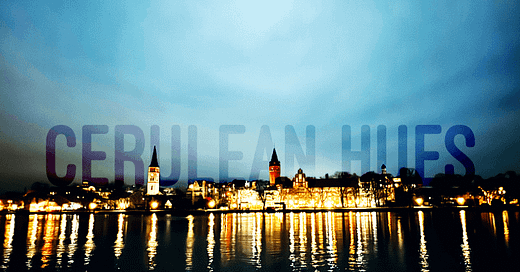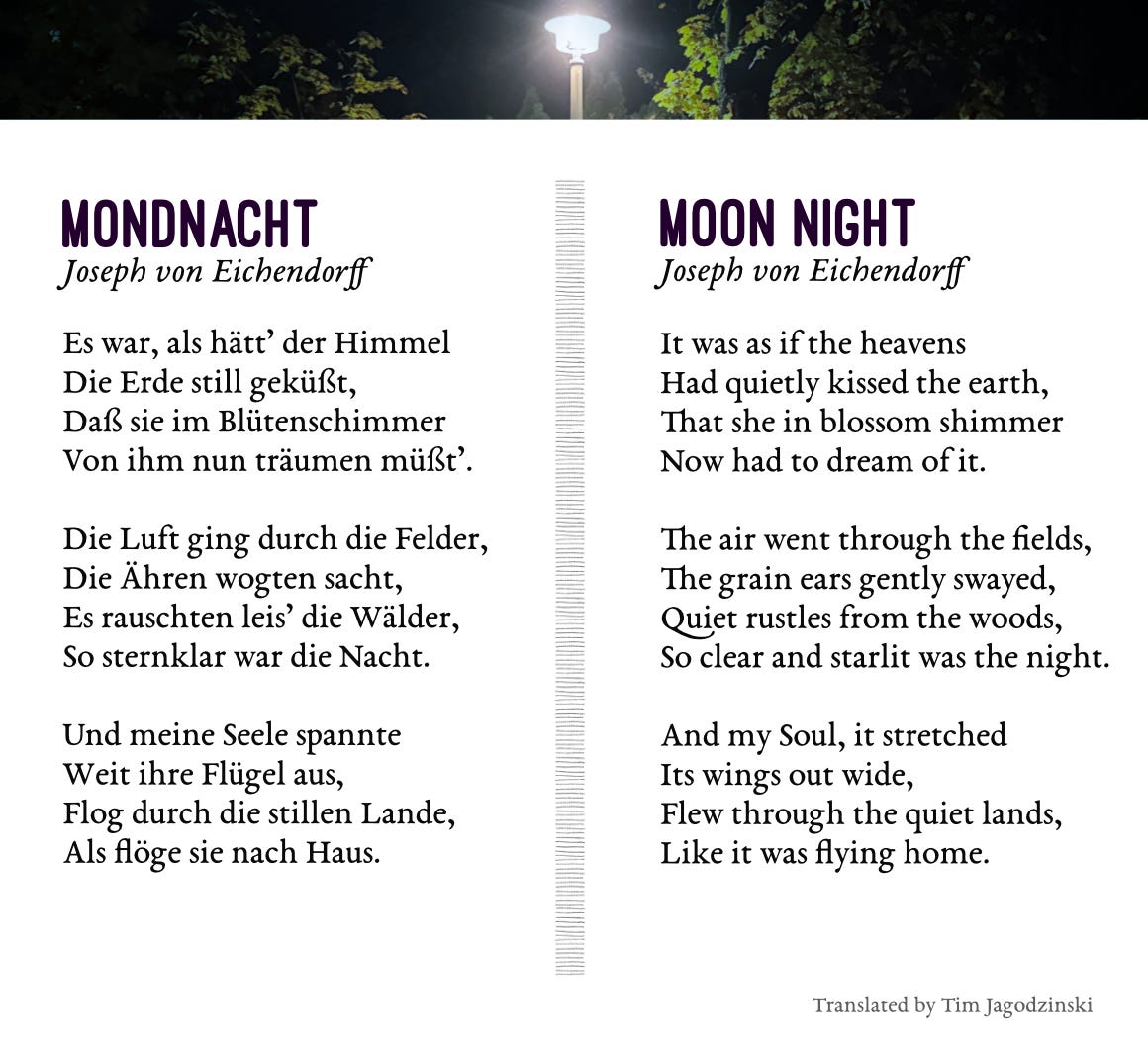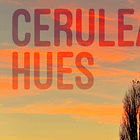The Enduring Poetry of Eichendorff’s Mondnacht, with a Translation
Known as the most beautiful German nature poem, “Mondnacht” defines what romantic nature poetry can be. I want to present it to you and provide a starting point for romanticism - for you to follow.
“Mondnacht” by Joseph von Eichendorff was written in 1835, making it 190 years old as of 2025. He is known for his beautiful nature poetry. “Mondnacht” is his most famous poem. It defines what romantic nature poetry can be.
Before I write more about it, I’d like you to read it first:
Writing prompt
It would be simple to also write about the night, but I prompt you with this:
Think about when you were young and walking home from an event, party, or friend. Think about the season, the weather, and how it made you feel. Focus on the simple impressions and form them into a poem.
If you write a poem using this prompt, I would love to read it!
Summary of “Moon Night”
Falling in love
Romanticism promotes the notion that nature is sacred and that we should be filled with a longing for it. The heavens kiss the earth, the kiss being a metaphor for the moon and starlight that make the blossom shimmer — and whatever the earth was dreaming of before, it is in love now and has to dream of the heavens. This implies that we can get a similar kiss and escape our human condition. It plays to our longing for love and attention.
Calming down
Stanza two draws a slightly eerie atmosphere where everything is connected and interacting, which is quite typical for Romanticism. The described nature is typical for Germany, where grain fields and wooded areas create a patchwork of both. Details like swaying grain ears show us how the (lovely) starlight makes visible what is hidden in the night. The air, as an extension of the sky connects and moves what is going on the earth. We kiss and breathe with our month.
Escaping
The final stanza delivers the conclusion to the poem and provides a central motif of Romanticism: “Weltflucht.” A direct translation would be “world escape”, the correct, modern translation would be “Escapism”.
Through evoking a bird, which symbolises freedom, our soul merges with nature, with the night, and flies through the scene to find peace.
Translation Challenges
Compound Words
A big challenge in translating German poems into English are compound words. They are a useful feature of the German language and come in two varieties. One is direct, like “Mondnacht,” translating into “Moon Night.” Others come as “Sternklar,” which translates to “star clear,” but are packed with additional, implied meanings. In this case “Sternklar,” implies that there are no clouds, the air is clear and therefor the stars light the surroundings.
In this case, “starlit” is the correct translation, but the “clear” that is missing, provides important context. As it communicates that the air is clear and there are no clouds. Thats why I decided to add “clear” to the verse to conserve this.
Translating Meaning with Word Choice
Another important aspect of the translation is the word “Himmel.” In German, it stands for “sky” (literal) or “heavens” (religious). As this is a poem is from the era of Romanticism, the obvious choice here is to use “heavens”, because this poem is about elevating nature into a transcendental experience. (This emphasises how important it is to know the historic context of a text, to understand it.)
Structure
The poems structure is simple: three stanzas with four verses and a cross rhyme (abab). It makes use of “untrue rhymes,” which are words that sound similar but do not rhyme. This grounds “Mondnacht”, as excessive rhymes can make the mood bright and happy. In this case, it is also used to associate different words:
Heavens with blossom shimmer
Fields with woods
Stretched with lands
The heavens make the blossoms shimmer. Fields and woods build a patchwork, and the lands are stretched far and wide.
Final Thoughts
Since I read this poem for the first time, I loved it. What makes it outstanding is the beautiful language, the simple yet expressive theme, and the masterful expression of it all in few words. It really fits what I wanted to describe in my previous article on how to read poems. It works without over analysing for deep meanings.
Modern Context
This poem is as relevant in 2025 as it was in 1837, when it was released. Romanticism was partly about merging with nature and the peace that would bring. We are now much, much further removed from nature than anyone writing in 1895 could ever imagine. The need to escape from our modern life gets more and more obvious. Our escapism means video games, movies, drinking, and other acts of consumption. This form of escapism stands out as not actually escaping us from anything — it provides diversion. These can be big or small, cheap or expensive, but they don’t take us out of where we are, neither physically, nor emotionally, or spiritually.
If we instead escape into nature, we can escape with body and mind. Not only is nature free; it brings us closer to where we belong, not as an act of consumption but as an act of enrichment. You create something — inside you.
Thank you for reading my article, it is always love you to have you!
Further Reading
Romanticism: https://en.wikipedia.org/wiki/Romanticism
Untrue rhymes: https://en.wikipedia.org/wiki/Assonance







